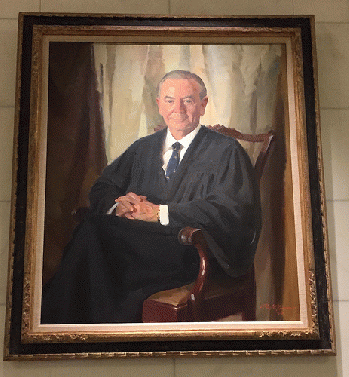U.S. Supreme Court Justice William J. Brennan, Jr.
This commentary is not legal advice, and we do not have a lawyer-client relationship. If you are involved in, or contemplating, suing or being sued for defamation you should consult a lawyer, preferably one with experience in such matters. Lest you wonder, that cannot be me; I've long since turned my bar memberships in Iowa, Texas, and the District of Columbia to "inactive" status. -- N.J.]
I'm going to open up our libel laws so when they write purposely negative and horrible and false articles, we can sue them and win lots of money. . . . So when The New York Times writes a hit piece which is a total disgrace . . . we can sue them and win money instead of having no chance of winning because they're totally protected. . . . we're going to have people sue you like you've never got sued before."President Donald Trump campaigned, and now governs, with ongoing attacks on the judiciary and the media -- two institutions designed by the drafters of our Constitution to provide a check on presidential abuse of power. For those who look to the "original intent," that was the original intent.
-- Presidential candidate Donald Trump, Rally, Ft. Worth Texas, Friday, February 26, 2016, Hadas Gold, "Donald Trump: We're going to 'open up' libel laws," Politico, February 26, 2016.
Trump can already sue for libel. For starters, he already has the legal right to sue any newspaper or other media outlet for defamation ("libel" if written, "slander" if spoken). Anyone can sue for defamation. That includes the president.
Whether the plaintiff will win involves many elements of a defamation claim, but here's a summary. There is a statement, about the plaintiff (not always obvious), the meaning of which must be ascertained (not always obvious), as understood by the individuals of relevance (such as customers of the plaintiff, neighbors, or members of the plaintiff's profession), that was factual in nature (as distinguished from "opinion"), false, and which caused a measurable harm to the plaintiff's reputation (among those individuals of relevance).
(Many of the president's tweets and other informal comments attacking and demeaning individuals and institutions would seem to fall within that definition of defamation. But the issues involved when a citizen wishes to sue the president for defamation would require another commentary.)
Different standards for plaintiffs who are public officials. If what Trump meant to say is that, as a public official, he must meet a slightly different standard than you or I to recover a judgment for defamation, he is right. That standard was set in a Supreme Court case.
What was new about Justice Brennan's analysis for the Supreme Court in the landmark defamation decision, New York Times v. Sullivan, 376 U.S. 967 (1964), was that he approached the language involved from a First Amendment perspective rather than, or in addition to, solely a defamation analysis.
He wrote,
"[W]e consider this case against the background of a profound national commitment to the principle that debate on public issues should be uninhibited, robust, and wide-open, and that it may well include vehement, caustic, and sometimes unpleasantly sharp attacks on government and public officials."Sullivan, the plaintiff, was one of three elected commissioners in Montgomery, Alabama --- and therefore a "public official." As such, the Court held, he had a right to sue for defamation, but to prevail on the elements just itemized he would need to show not just that the Times story had some factual errors.
He would need to show what the Court called "actual malice" -- an unfortunate choice of words, since the everyday meaning of "malice" was no part of the standard. "Actual malice" meant that he would need to show "that the statement was made . . . with knowledge that it was false or with reckless disregard of whether it was false or not."
The standard involving plaintiffs who are ordinary citizens focuses on, recognizes and protects the asset value of individuals' reputations -- with the byproduct of reducing remedies involving violence. Unlike the standard involving ordinary citizens, which only requires a false statement, public officials must show a measure of fault on the part of the media. This is because of the First Amendment value of speech involving public policy and public officials -- speech that lies at the heart of what the First Amendment was designed to protect.
Balancing the desire to offer citizens a means for protecting their reputations against the value of First Amendment speech, this is where the Court came out.
(Note: You can view every article as one long page if you sign up as an Advocate Member, or higher).






